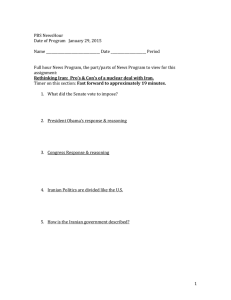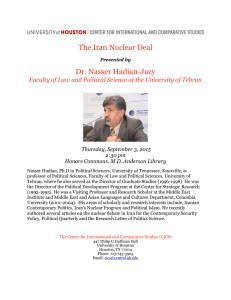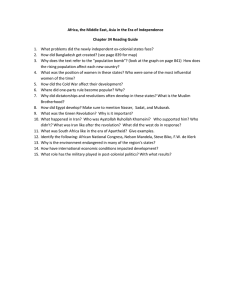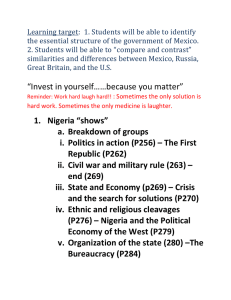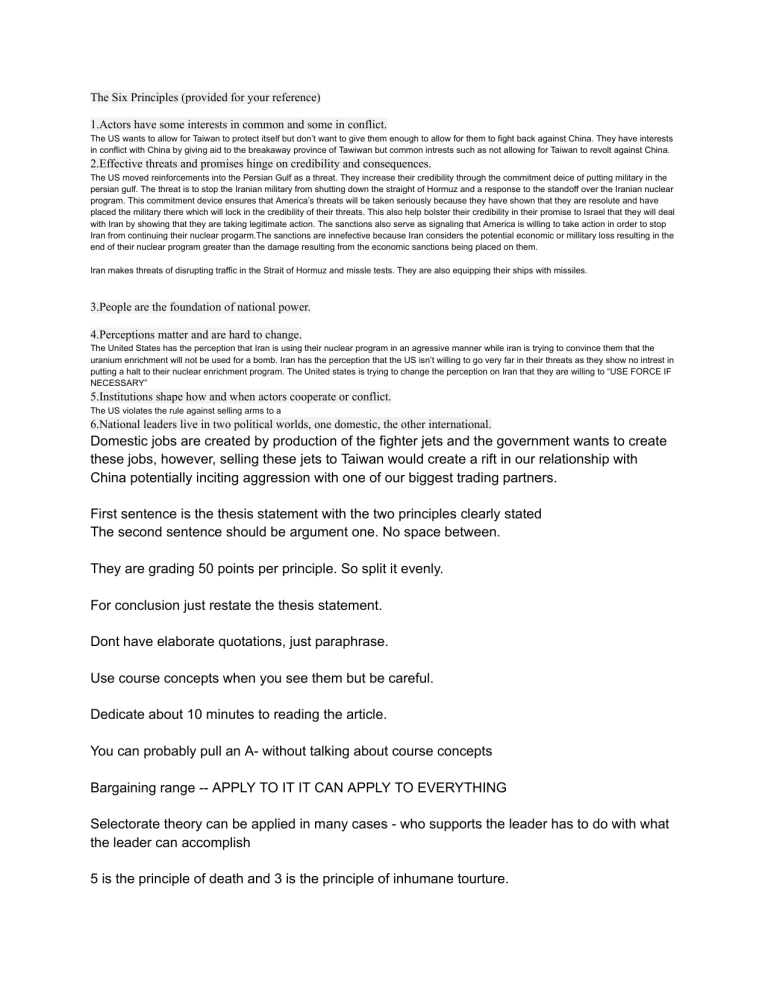
The Six Principles (provided for your reference) 1.Actors have some interests in common and some in conflict. The US wants to allow for Taiwan to protect itself but don’t want to give them enough to allow for them to fight back against China. They have interests in conflict with China by giving aid to the breakaway province of Tawiwan but common intrests such as not allowing for Taiwan to revolt against China. 2.Effective threats and promises hinge on credibility and consequences. The US moved reinforcements into the Persian Gulf as a threat. They increase their credibility through the commitment deice of putting military in the persian gulf. The threat is to stop the Iranian military from shutting down the straight of Hormuz and a response to the standoff over the Iranian nuclear program. This commitment device ensures that America’s threats will be taken seriously because they have shown that they are resolute and have placed the military there which will lock in the credibility of their threats. This also help bolster their credibility in their promise to Israel that they will deal with Iran by showing that they are taking legitimate action. The sanctions also serve as signaling that America is willing to take action in order to stop Iran from continuing their nuclear progarm.The sanctions are innefective because Iran considers the potential economic or millitary loss resulting in the end of their nuclear program greater than the damage resulting from the economic sanctions being placed on them. Iran makes threats of disrupting traffic in the Strait of Hormuz and missle tests. They are also equipping their ships with missiles. 3.People are the foundation of national power. 4.Perceptions matter and are hard to change. The United States has the perception that Iran is using their nuclear program in an agressive manner while iran is trying to convince them that the uranium enrichment will not be used for a bomb. Iran has the perception that the US isn’t willing to go very far in their threats as they show no intrest in putting a halt to their nuclear enrichment program. The United states is trying to change the perception on Iran that they are willing to “USE FORCE IF NECESSARY” 5.Institutions shape how and when actors cooperate or conflict. The US violates the rule against selling arms to a 6.National leaders live in two political worlds, one domestic, the other international. Domestic jobs are created by production of the fighter jets and the government wants to create these jobs, however, selling these jets to Taiwan would create a rift in our relationship with China potentially inciting aggression with one of our biggest trading partners. First sentence is the thesis statement with the two principles clearly stated The second sentence should be argument one. No space between. They are grading 50 points per principle. So split it evenly. For conclusion just restate the thesis statement. Dont have elaborate quotations, just paraphrase. Use course concepts when you see them but be careful. Dedicate about 10 minutes to reading the article. You can probably pull an A- without talking about course concepts Bargaining range -- APPLY TO IT IT CAN APPLY TO EVERYTHING Selectorate theory can be applied in many cases - who supports the leader has to do with what the leader can accomplish 5 is the principle of death and 3 is the principle of inhumane tourture. Principle 3: It is not “political leaders cant make foreign policy decisions without the support of their people” That is principal 6! Principle 3 means people are human resources and when a country trains its human resources well, they grow the GDP of a country thereby advancying their military, economics, and technology. Well trained human resources make a country more powerful in politics. Sweden has a small population but people are educated and well utilized and therefore they have a higher GDP. If the people are productive, the government has more political ammunition. “We have more resources we are not pushovers” Principle 5: People mess up by seeing institutions and interpreting it as organziations. IT MEANS RULES. There are rules in international relations that countries are expected to follow. Who designed those rules and how well they are enforced decides whether actors will cooperate with the rules or not. Sovereignty is an example of the rule -- you cannot invade the territory of a state. It is designed by states. Think about who enforces the rule. How well the rule is enforced. What's the rule, who designed it, who enforced it, and what the two parties' interests are in regards to that rule. (Iraq's interest in not having their sovereignty violated and America's interest in violating sovereignty) this will predict cooperation or conflict. Other rules include, genocide, violence against POW, use of chemical weapons. These rules generally came about through treaties signed by countries of the world. Principal one can be applied to anything USE IT Use the bargaining range Reservation point is outcome of war minus cost of war. If you get 800,000 from war and spend 100,000 fighting it, your reservation point is 700,000. Reservation point is the settlement equal to going to war. The overlap between the reservation point is the zone of agreement. What both sides would be fine with accepting. Because war is costly there is always a zone of agreement. If states have interests in common and conflict, you should ask which ones are most important. Are the ones in common more important than the ones conflict. Common intrest - avoid fighting Conflicting intrest - get the best deal posible Isreal and palestine all intrests they have in common are superseeded by the ones they have in conflict. Principal two Use costly signals, commitment problems, commitment devices, selectorate theory Principal six If you see a democracy as one of the two actors ask what the domestic actors want. We had to leave afghanistan becasue the public was fed up with our occupation. Do one and six -- Sid Commitment devices insure long term credibility on threats or promises. 1.Actors have some interests in common and some in conflict. 2.Effective threats and promises hinge on credibility and consequences. 3.People are the foundation of national power. 4.Perceptions matter and are hard to change. 5.Institutions shape how and when actors cooperate or conflict. 6.National leaders live in two political worlds, one domestic, the other international.

